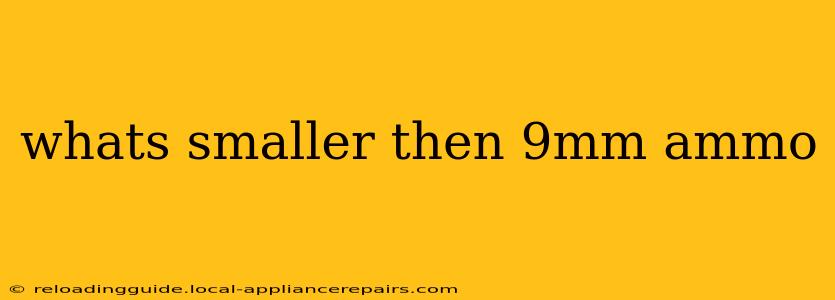What's Smaller Than 9mm Ammo? A Comprehensive Guide to Smaller Calibers
The 9mm Parabellum, or 9x19mm, is a popular and widely used handgun cartridge. But what if you need something smaller? Perhaps for concealed carry, target shooting, or specific self-defense scenarios? Many smaller calibers exist, each with its own advantages and disadvantages. This guide explores some of the most common calibers smaller than 9mm, examining their characteristics and applications.
Understanding Caliber and its Significance
Before diving into specific cartridges, it's essential to understand what "caliber" means. Caliber refers to the diameter of the bullet, typically measured in millimeters (mm) or inches. A smaller caliber generally means a smaller bullet, which can translate to several factors:
- Reduced Recoil: Smaller calibers produce less recoil, making them easier to shoot and control, especially for smaller-framed individuals or novice shooters.
- Increased Capacity: Smaller cartridges often allow for higher magazine capacities in the same size firearm.
- Enhanced Concealability: Smaller cartridges can be housed in more compact firearms ideal for concealed carry.
However, smaller calibers also usually mean:
- Less Stopping Power: Smaller bullets generally have less kinetic energy upon impact, potentially reducing their effectiveness in self-defense situations.
- Increased Sensitivity to Shot Placement: Precise shot placement is crucial with smaller calibers to maximize their effectiveness.
Popular Calibers Smaller Than 9mm
Several calibers are smaller than 9mm, each with its own niche:
1. .380 ACP (9x17mm): This is perhaps the most popular caliber smaller than 9mm. It offers a good balance between manageable recoil, decent stopping power (though less than 9mm), and relatively high magazine capacity. Often used in slim, easily concealed handguns.
2. .22 Long Rifle (.22 LR): A ubiquitous and inexpensive round, the .22 LR is known for its incredibly low recoil, making it ideal for training and plinking. However, its stopping power is significantly less than 9mm, limiting its suitability for self-defense.
3. .25 ACP (.25 Auto): One of the smallest centerfire pistol cartridges, the .25 ACP is primarily known for its extremely low recoil and small size. However, its extremely limited stopping power makes it a less-than-ideal self-defense round. It's more commonly used for target shooting or as a backup weapon.
4. .22 Magnum (.22 WMR): Offering more power than the .22 LR, the .22 Magnum still boasts manageable recoil and is suitable for small game hunting. However, it's still not a powerful round compared to the 9mm.
Choosing the Right Caliber: Considerations
The best caliber for you depends heavily on your needs and intended use:
- Self-defense: While a smaller caliber might be easier to carry and shoot, the reduced stopping power necessitates exceptionally accurate shot placement. Consider the trade-offs carefully.
- Target shooting: Smaller calibers are ideal for recreational shooting due to their low recoil and cost-effectiveness.
- Concealed carry: Size and weight are paramount, making smaller calibers attractive. However, always prioritize stopping power within the constraints of concealability.
- Hunting (small game): .22 LR and .22 Magnum are common choices for small game hunting, depending on the target size and distance.
Ultimately, the choice of caliber is a personal one. Research thoroughly, consider your individual needs and limitations, and possibly even test-fire different calibers at a range to determine the best fit. Consulting with experienced firearms instructors and professionals can also provide valuable guidance.

